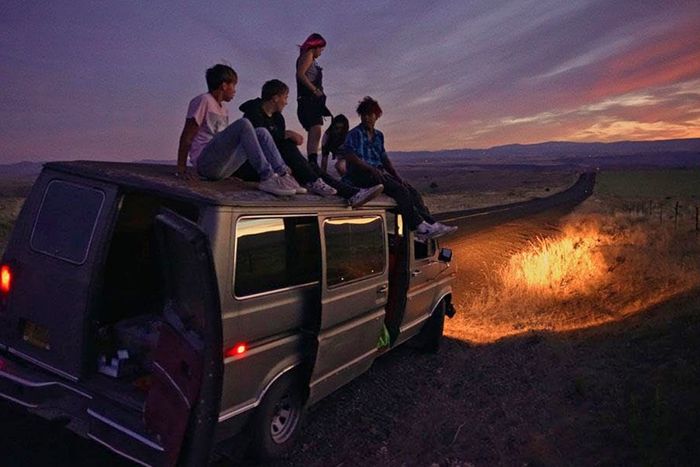
The fictional town of Wiley, Oregon, is 513 miles from the Pacific coast. Measured as the crow flies, that would put it in Idaho, but the freewheeling road-trip movie Gasoline Rainbow is not about taking the direct route, and Wiley is as much an idea as it is a location, anyway. It’s where teenagers Tony Aburto, Micah Bunch, Nichole Dukes, Nathaly Garcia, and Makai Garza (the characters share names with the first-time actors playing them) grew up and feel constrained by, for reasons that are specific to each of them but also just part of the experience of being 18. Whenever one of the five characters, who take off in a battered van for the coast for a postgraduation road trip, says, “Fuck Wiley,” it sounds like the battle cry of someone sure that their better, truer self is out there waiting for them to be freed from everything they’ve known. Gasoline Rainbow, a generous film that’s ragged at the edges but manages bursts of the sublime, convinces you that the quintet have gotten some glimpse of those future selves while making their way across the state to the ocean.
It’s tough to make a movie about present-day teenagers without leaning into the urge to anthropologize their youth or to project your own on top of it, but Gasoline Rainbow gives its characters the benefit of not having to be stand-ins for their generation. It comes from Bill Ross IV and Turner Ross, filmmaking siblings who started off in the world of documentary but who have increasingly been working in an unclassifiable hybrid space between fiction and non. Their last feature, Bloody Nose, Empty Pockets, was shot in a Louisiana dive bar being passed off as a Las Vegas one and captured the feeling of a marathon drinking session with sticky-floored authenticity even as its actors moved within a staged setup. This new film feels even more like a wild experiment in improv over a structured framework with the Ross brothers carefully charting each day of shooting but not sharing their plans with the cast members, who react to things as they happen. Or don’t happen — like any road trip, half of Gasoline Rainbow is about shooting the shit or staring out the window or singing along to music as the miles go by.
This looseness makes the film a rougher ride to start. For a decent stretch, the characters — introduced with a flash of their student IDs — remain a blur of brightly dyed hair and smartphones silhouetted against the splendor of Pacific Northwest sunsets. While the Rosses layer in introspective audio from interviews with the cast that offers some insight into their characters, whoever is supposed to be speaking is never clear. Slowly, though, as the five travel with vague intentions to attend a beach party someone tells them about called “the End of the World,” they emerge as distinctive individuals who each have their own dynamic in the group and their own hopes and fears for the future. The gradual nature of these reveals has its own benefits. When Nathaly tells a stranger at a rowdy truck stop about how her father, whom she calls “the heart of my family,” was deported, or when Micah wipes tears away while catching up with a cousin who has put the crew up for the night at his home in Portland, it feels like vivid, unforced vulnerability — whether it’s true or not.
That cousin, one of several characters the kids encounter in episodes along the way, tells Micah that “the big difference between grown-ups and children? Grown-ups aren’t supervised. That’s it.” They’re wise words, though the grown-ups the road-trippers happen to meet are often blessedly well intentioned. There’s the woman who gets them high out on a dried-out lake bed like a lunar landscape and the crusty punks who guide them through hopping a freight train when their van dies. There’s the skateboarder wearing a captain’s hat who shows them a park under an overpass and tells them he’s “nautical by nature” and the metalheads who house them and then cook them breakfast in the morning while listening to the Lord of the Rings score and talking, charmingly, about how badass Tom Bombadil is. You could argue there’s a touch of fairy tale to how few dangers the teens encounter on their picaresque journey, though one of the core ideas of the film is that it takes being young, unburdened by responsibilities, and relatively unscarred by life to be this open to going where chance takes you. Beneath the Spotify present and the punk-rock attitude, there’s the heart of a beatnik to Gasoline Rainbow. Some parts of being a teenager just feel universal no matter which decade we’re in.
More Movie Reviews
- Robot Dreams Is a Good Robot Movie and a Great New York Movie
- Behold, an Actually Good Omen Movie
- It’s No Wonder That Cannes Fell for Anora





